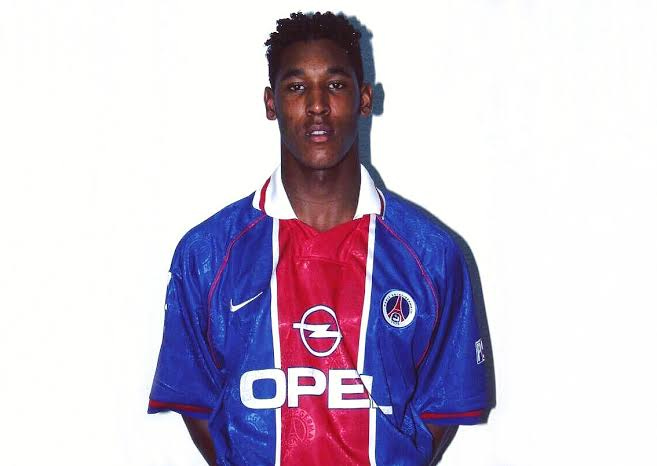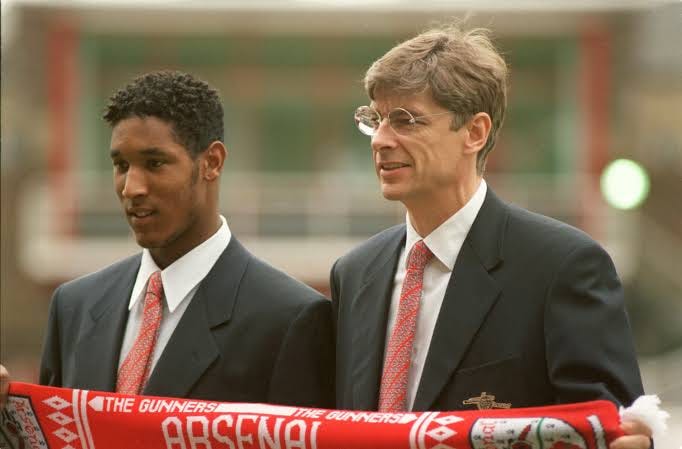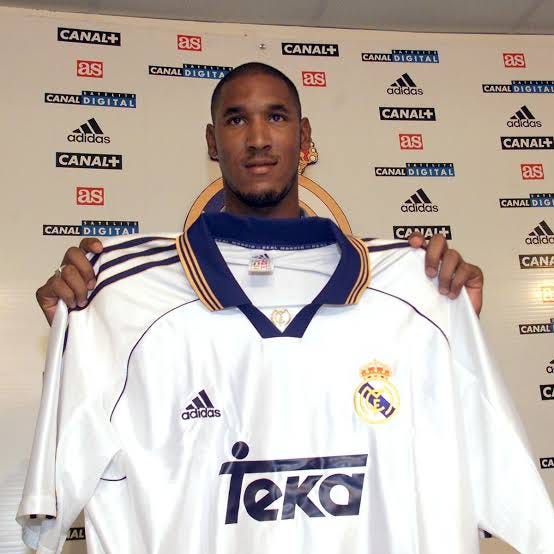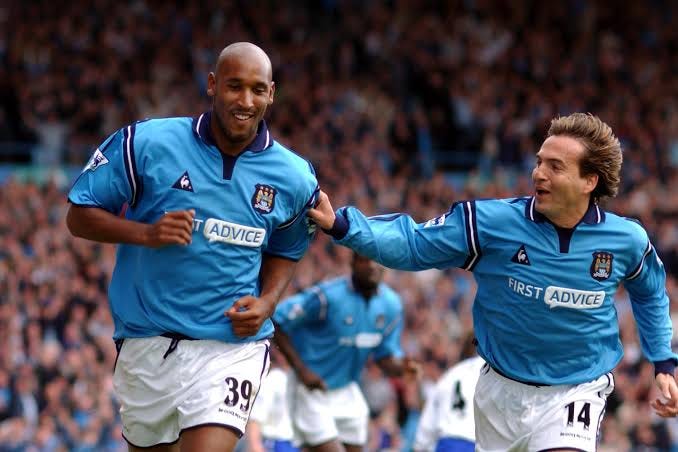Nicolas Anelka: A Tale of Triumphs, Trials, and Controversies
From promising talent to Football mercenary
In the year 1997, as Henry anxiously sat on the bench at AS Monaco, yearning for more playing time, there emerged another young talent from his past. This kid, a former teammate from their academy days, was a year younger than him but was already making waves in the Premier League. That kid was Nicolas Anelka. Arsène Wenger hailed Anelka as "the greatest discovery of his career," and Gérard Houllier dubbed him "the best striker of his generation."
Anelka's potential seemed limitless, but there was always a sense that he believed himself to be the best player in the world. This self-assuredness may have hindered his true ascent to greatness. He was unapologetically outspoken, often politically incorrect, and had an insatiable need for control over his career choices. He rushed through his career moves, ultimately damaging his professional journey. He once admitted, "All that I've done, don't do it… you will only make enemies."
It's astonishing to think that Nicolas Anelka managed to secure an impressive list of achievements, including 2 Champions League titles, the Euros, an Intertoto Cup, a Confederations Cup, a European Supercup, and a Cup Winners Cup. He even earned a Ballon d'Or nomination. However, for many, the prevailing sentiment is that he fell short of his potential and squandered his talents. His career was a rollercoaster of twists and turns, as Thierry Henry put it, "If somebody made a movie about Anelka’s life, it would have more parts than Star Wars."
The saga began when these two talents first crossed paths at Clairefontaine academy, the crème de la crème of academies in France, alongside future stars like Saha and Gallas. Despite Henry's seniority, he looked up to Anelka, acknowledging, "He was younger, but I didn't see him like that… to me, he was the biggest talent in the academy. Some were great, but he had a gift." Just two years later, Paris Saint-Germain snatched Anelka from the academy, and by the age of 16, he was already making his debut for the club.
At an age when most players would have been loaned to smaller teams to gain experience, Nicolas Anelka's extraordinary talent set him apart. Commentators couldn't help but focus on him as he made his first appearance, exclaiming, "Why are the cameras focusing on him? Because he is the talent of the future." His early promise was evident.
During the next year and a half, Anelka, at just 17, shared a locker room with football legends like George Weah, Raí, and Ginola. Despite earning some significant silverware, such as the cup winners cup, he was frustrated with only receiving 20 minutes of playing time per match. This impatience became a problem for his club, leading to clashes and even youth team assignments. However, Arsène Wenger saw an opportunity and invited him to join Arsenal.
This move caused a massive stir in France, leading to legal battles between PSG and Arsenal. PSG eventually received a modest sum of 600 thousand euros. Anelka's journey in London didn't start smoothly; he struggled for playing time and faced criticism from Wenger, who noted his mentality, physicality, and judgment were lacking. With Ian Wright and Dennis Bergkamp leading the attack, breaking into the starting eleven seemed improbable.
But then, a stroke of luck came his way. In a crucial match, as the team was about to depart, Nicolas Anelka decided he didn't want to play. Wenger intervened, delivering an inspiring speech that convinced the young talent to participate. Just nine minutes into the game, Paul Merson got injured, Anelka was subbed in, and he assisted both goals, earning himself the man of the match award.
The following season, Anelka's fortunes continued to rise. Ian Wright suffered a career-ending injury, opening the door for Anelka to shine. He contributed to 11 goals in 14 league matches, scored in the FA Cup final, and played a pivotal role in Arsenal's historic league and cup double. The subsequent year, he further elevated his game with 25 goal contributions, narrowly missing out on being the league's top scorer and receiving the PFA Young Player Of The Year Award, establishing himself as one of the most promising young talents globally.
Around the same time, after being unceremoniously dropped from France's World Cup squad without explanation, Anelka finally got another chance to represent his national team. He made a sensational impact by becoming the first Frenchman to score against England at Wembley, doing so twice, leading to Didier Deschamps declaring, "We have found our Ronaldo."
Despite being in a position to become Arsenal's star player, Anelka made a surprising decision. Fueled by a poll where Arsenal fans preferred Ian Wright over him (not taking into account the legend's legacy), and influenced by his brothers, who often led him to prioritize money and hasten his decisions, he sought a new club. In his own words, "I was furious with them, I left Arsenal to punish the fans."
In a whirlwind move, Anelka transferred to Real Madrid for 35 million euros, just three months after turning 20. If not for Christian Vieri's 46 million euro transfer in the same year, he would have become the most expensive player of all time. His journey was unfolding at a breathtaking pace.
Nonetheless, the situation wasn't as promising as it might appear. Anelka's departure from Arsenal had an unforeseen twist. Had he stayed, his friend Thierry Henry would have joined the team just weeks later. With Arsène Wenger planning to create a formidable duo out of Anelka and Henry, one can only wonder what incredible partnership they might have forged. Instead, with Anelka's departure, Henry was thrust into the spotlight, ultimately becoming Arsenal's greatest ever player. Anelka's success only served to magnify his own decline.
Anelka's move to Real Madrid turned into a calamity. The British media labeled him a traitor, while the Spanish media portrayed him as a spoiled brat destined to fail. Anelka's own perspective on stardom had evolved, and he admitted, "When I was a kid, I never said I wanted to become a footballer, I said I wanted to become a star… But then, I finally understood what it meant to be a star at Real Madrid… and I hated it."
To make matters worse, Anelka's arrival was seen as a threat to Fernando Morientes's place on the team. In an attempt to protect their friend, the Real Madrid locker room became hostile toward Anelka. They barely communicated with him and treated him poorly. It was a cutthroat environment that turned Anelka paranoid, confining himself to his mansion, feeling pursued by the world, and extinguishing his talent. Five months later, Anelka had yet to score a single goal.
His desperation led him to seek validation. The newspaper Marca lured him to their offices under the guise of friendship, got him to play FIFA, and the next day, the cover featured a photo of him with the caption, "Anelka finally scores… on PlayStation." His paranoia seemed justified.
Anelka's experience in Spain was so toxic that when Real Madrid traveled to Brazil for the Club World Cup, he found himself more at ease and less fearful. In that tournament, he scored three goals in three matches, becoming the tournament's top scorer. However, any hope of carrying this momentum into the regular season was dashed by a six-week-long injury.
As the situation worsened, Anelka's frustration with the board's refusal to address his lack of playing time boiled over. He boycotted training, publicly accused everyone at the club of treating him poorly, and was handed a 45-day suspension. His signing began to look like one of the worst in history.
Yet, fate dealt Anelka a twist of irony. After enduring 35 league matches with just one goal, he was given a chance to start in both Champions League semi-final matches against Bayern Munich. Anelka seized the moment, scoring twice and propelling Real Madrid to the brink of their 7th Champions League title.
Nevertheless, no silver lining could compensate for the gravity of the situation. Anelka didn't mince words, labeling this period as "the biggest mistake of my life." With his spirits at an all-time low, the Euros that summer only exacerbated his feelings. Despite France's victory in the tournament, with Anelka even contributing an assist that secured their place in the final, he struggled with fitness throughout. This led to his benching in the decisive match, leaving him to reflect, "I was part of it, but I didn't contribute to anything… if I could erase that award from my record, I would." If you think he was being too hard on himself, consider that he was later nominated for the Ballon d'Or.
Feeling lost and unappreciated, Anelka resorted to the ultimate cliché in the sport and returned to where it all began, rejoining PSG. His homecoming was met with cheers and open arms, even earning him the captain's armband as they shattered the league's all-time transfer record, intending to build their project around him. Anelka had just lost a battle, but he was being welcomed home like a hero. However, what initially seemed like a fairy tale soon took a darker turn.
Initially, PSG promised Anelka that they would build a team centered around exploring talents from the suburbs of Paris, like him. But within just three months and the first signs of poor results, the board panicked. They sacked the manager and completely reneged on their promises, leaving Anelka disheartened. Not only did results not improve with the change, but Anelka had been promised a different vision.
With Anelka upset, his performance suffered dramatically. He went from scoring 11 goals in the first half of the season to just 3 in the second, publicly blaming the coach for the decline. Adding to this, a disappointing but victorious performance at the Confederations Cup. By the start of his second season, it was clear that Anelka's days were numbered.
With only two more goals over the next six months, Anelka began pushing for an exit. He ultimately settled for a loan move to Liverpool, a move that stands out due to the missed opportunity for success. Anelka performed well, was content, and had the support of the fans. The coach, Gerard Houllier, a fellow Frenchman who had coached him in his youth, clearly had his best interests at heart.
However, Houllier got wind of Anelka's brothers' contact with other clubs, and the lack of communication between Anelka and the coach allowed this situation to escalate. By the time they realized the miscommunication, it was too late.
Anelka had already embarked on his fourth transfer in five years, this time joining Manchester City. This transfer was puzzling for a recently promoted club and a stark contrast to the player who had been nominated for the Ballon d'Or just two years earlier, making the whole situation seem almost embarrassing.
Despite his many ups and downs, Anelka's footballing journey remained a rollercoaster. While he often found himself near the top of the Premier League's goal scorers table, comparing his path to that of his friend Thierry Henry illustrated his struggles. Henry led Arsenal to an invincible season and came close to winning the Ballon d'Or, while Anelka grappled with City, barely avoiding relegation.
His situation was further compounded in the national team. While Henry enjoyed a prolific year with 18 goal contributions for France in just 14 matches, Anelka had largely been forgotten since 2001. Even when the national team manager paid him a visit in England, Anelka's reaction was far from pragmatic.
He took offense when the coach claimed he "didn't know him too well," reacting angrily and eventually declaring that he would never play for France again, insisting the coach would have to "get down on his knees" to convince him. What was already a challenging situation became more embarrassing when he reversed his decision a year later, apologized to the manager, and expressed his desire to return, only to be ignored.
While Anelka may have found stability during his third year at Manchester City, the club faced financial troubles, which led to his transfer to Fenerbahce. Despite injuries hindering his progress and being moved to the wing, Anelka's game suddenly evolved. He became Fenerbahce's primary playmaker, even prompting Zinedine Zidane to advocate for his return to the French national team. Although he did return, he once again missed the World Cup in favor of Sidney Govou.
Nicolas Anelka still had a chance to secure a move back to a top team, and he joined Bolton. While the club had previously signed aging players, Anelka's arrival brought a surprising turn of events. After a slow start with no goals in his first 11 matches, he had an incredible run, contributing to 31 goals in 38 matches. Chelsea took notice, paying an impressive £18 million for his signing, hoping he could fill the void left by the absence of Didier Drogba during the African Cup of Nations.
However, Anelka didn't just fill the void; he became Drogba's main supplier, averaging an assist every 130 minutes and even assisting the goal that led Chelsea to the Champions League final.
Just as it seemed Nicolas Anelka had come full circle and was back on top, he was handed the responsibility of taking the penalty that would define Chelsea's season. He missed, leading to Manchester United winning the Champions League trophy, and Chelsea finishing the season trophyless, securing second place in four out of the five competitions they were involved in.
Nicolas Anelka admitted that "missing that penalty made me feel like a traitor," but instead of giving up, he returned stronger, delivering one of the best seasons of his career.
Starting the season with 13 goal contributions in 13 matches, he went on to tally 34 contributions, including 19 league goals, making him the Premier League's top scorer ahead of Cristiano Ronaldo. At 30 years old, Nicolas Anelka had finally demonstrated that he could compete with the best.
However, his promising momentum took another downturn. After one more strong season, securing the league and cup double, Nicolas Anelka was called up for the World Cup. It was the perfect opportunity to cement his legacy as a legend. But before the tournament even began, Anelka was already threatening to quit, citing a premonition of something bad coming. Although he stayed, midway through the second match, he clashed with the coach.
The media exaggerated the incident, leading the federation to ban him from the tournament without verifying the accuracy of the reports. In solidarity, the players boycotted training, and France finished last in their group, leading to one of the biggest scandals in French football history.
Despite repeatedly being proven right,Nicolas Anelka was banned for 18 matches, effectively ending his international career. After one more season with Chelsea, where he even managed to outperform Drogba, he clashed with Andre Villas-Boas and left the club just months before they won their first-ever Champions League.
Anelka's career took a mercenary turn, with stints in various countries, including China and Juventus, where he had limited playing time, and even West Bromwich. He shocked the world one final time by celebrating a goal with an anti-Semitic gesture. It was later proven that he wasn't aware of the gesture's implications and had no ill intent, but it was a fittingly dramatic end to Anelka's colorful career.
Thank you for reading!













